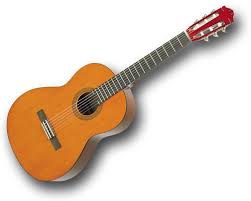
I bought the guitar I play most of the time these days at a music shop on Scott Street in San Francisco. It must have been in the mid 1970's, because I have pictures of me playing that axe around that time or a little later. It was a Japanese knock-off of a Spanish classical style, like a Ramirez, made with a Brazilian rosewood back, a German spruce top and an ebony fretboard. It cost about $250, and it came with a hard shell case of brown leather and plush orange lining. The guitar has mellowed with age, the tone actually improving, but it was always pretty good. A few years ago I thought about replacing it. To get a guitar made of similar wood (they're not actually supposed to use Brazilian rosewood anymore because of the rain forest problem), you need to spend at least a couple of grand, so I tried a few out at a well-stocked specialty store south of Market Street in SF. These didn't actually sound as good as mine, and the action (basically, the ease of playability) was no better. I found I needed to go as high as three grand to actually do better. After a while, I just forgot about it and went back to playing the same old guitar.
I have sheet music from my first purchases in the late 1960's, when I first started playing a lot of classical guitar (and learned how to read for the instrument). A particular favorite is a slim, tawny, corny-looking volume filled with the great masterpieces of the repertoire: Tarrega's Recuerdos de la Alhambra, Albeniz' Leyenda, Granados' Playera, Bach's Bouree from the Lute Suite in E Minor. Almost every tune in the book is a hit; just a few clunkers in the bunch. It cost $1.95, according to the cover. Cheaper than a Starbucks Venti. I know that I'll die while still trying to master all the music in that book.
Over the years I picked up a music stand and even one of those classical player's foot stools, so you can rest the guitar's curve on your left knee, where it belongs for classical stuff. Or bossa nova, or even Duke's Do Nothin' Till You Hear From Me. It was the Duke, in fact, who said the truth: there are only two kinds of music - good music and bad music. Anyway, that paraphernalia cost about $20, total. We're not at three hundred bucks yet, and we're spanning thirty years of playing.
You have to re-string a guitar regularly if you want it to sound good. You can buy a set of classical strings for six bucks, but I tend to go high end and buy Savarez Carte Rouge strings, which set me back about fifteen. That's every six months or so. You can change them more often, but I'm playing in my den, not Carnegie Hall.
I've made friends with that guitar, played weddings, parties and paid gigs, shown off, courted ladies, jammed with friends and family. Spent hours and hours, hundreds, probably thousands of hours, alone with it, just me and the guitar, working through the polyphony and counterpoint of ancient music, like the music in that buck ninety-five book.
I was thinking about all this while reading a book called Growth Fetish by Clive Hamilton, an Australian political theorist, think tanker, humanist, Big Picture Guy. The book's about the essential disconnection between the GDP "growth" of a country and the happiness or sense of well-being of its citizens. Beyond a threshold level of wealth (which the United States crossed decades ago), enough to assure basic prosperity to the citizenry, there's no correlation at all between GDP "expansion" and human happiness. Happiness arises from things in life other than material accumulations after the basics are taken care of. Human relationships, a sense of purpose in life, interesting things to do. America is the richest country but it isn't the happiest, not by a long shot. We lost our way in the fetishistic pursuit of material prosperity, and finally crashed the economy in the desperate quest for acquisition, taking on debts (both government and private) we can't repay, that depended on an insane expectation of exponential growth to sustain. Truth is, as measured by statistically accurate surveys, we were happier in America in the 1950's than we are now, when things were simpler and more egalitarian. That will probably come as no surprise to members of my generation. We remember.
That guitar teaches me the essential truth of Hamilton's thesis. For years at a time, in the pursuit of more complicated endeavors, I have neglected that guitar. I have been out in the world getting the money together to acquire other things. The guitar has sat in the closet, in the case, unloved, unused, with tarnished strings and a dusty sound board. Then I remember I still have it, still know how to play, and I bring it out, re-string it, polish it, and it leaps back to life, better than ever. Then I get in the habit of playing again, learning new stuff or, more likely, re-learning what I already know.
I suppose that if you amortize the cost of the whole guitar experience over the thirty years I've owned that precious instrument, the original price, the books, the stand, the stool, all the strings - it doesn't come to a thousand dollars. Maybe thirty bucks a year for all that enjoyment. 75% of what it costs to fill up the car with gas so I can go out and drive in traffic jams. Without a doubt, playing that guitar has given me more pleasure than anything else I can think of, and certainly more than anything else I can do alone. And as I keep getting older - hell, maybe even more than that.
![]()
![]()

![]()

